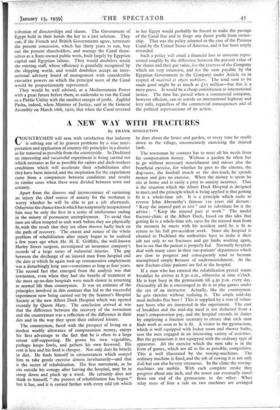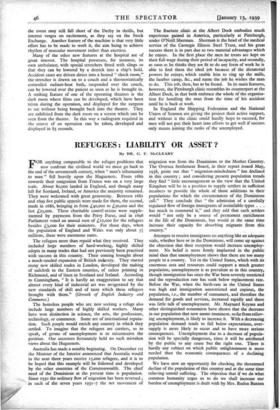A NEW WAY WITH FRACTURES
By FRANK SINGLETON
COUNTRYMEN will note with satisfaction that industry is solving one of its gravest problems by a wise inter- pretation and application of country-life principles in a district as far removed as possible from the countryside. In Dockland an interesting and successful experiment is being carried out which recreates as -far as possible for sailors and dock-workers conditions which will accelerate 'their rehabilitation after they have been injured, and the inspiration for the experiment came from a comparison between conditions and results in similar cases when these were divided between town and country..
Apart from the distress and inconvenience of sustaining an injury the chief source of anxiety for the workman is worry whether he will be able to get a job afterwards. Otherwise the chance knock which has temporarily incapacitated him may be only the first in a series of misfortunes ending in the misery • of permanent unemployment. To avoid that men are 'often tempted to seek work before they are physically fit,with 'the result that they are often thrown badly back on the path of recovery. The extent and nature of the whole problem of rehabilitation after injury began to be realised a few years ago when Mr. H. E. Griffiths, the well-known Harley. Street surgeon, investigated an insurance company's records- of a 'large series of industrial injuries. The gap between the discharge of an injured man from hospital and the date at which he again took up remunerative employment was a disturbingly long one—sometimes as long as four years. The second fact that emerged from the analysis was that townsmen, even when they had the benefit of treatment at the most up-to-date hospitals were much slower in returning to normal life than countrymen. It was an estimate of the principles involved in this contrast that led to the successful experiment now being carried out by the Seamen's Hospital Society at the new Albert Dock Hospital which was opened recently by Queen Mary. The conclusion arrived at was that the difference between the recovery of the townsman and the countryman was a reflection of the difference in their diet and in the way they spent their enforced leisure.
The countryman, faced with the prospect of living on a modest weekly allowance of compensation money, enjoys his first advantage to the fact that he is often to a large extent self-supporting. He grows his own vegetables, perhaps keeps fowls, and gathers his own firewood. His rent is less and his food is cheaper. Not only does he benefit in diet. He finds himself in circumstances which compel him to take gentle exercise almost involuntarily—and that is the secret of rehabilitation. His first movement, as he sits outside his cottage after leaving the hospital, may be to stoop down and pluck up a weed. He certainly does not think to himself, " the process of rehabilitation has begun" but it has, and it is carried farther with every odd job which he does about the house and garden, or every time he strolls down to the village, unconsciously exercising the injured limb.
The townsman by contrast has to meet all his needs from his compensation money. Without a garden he often has to go without necessary nourishment and misses also the beneficial exercise, for whether he goes to the cinema, the dog-races, the football match or the dirt-track, he spends money and gets no exercise. When the money is spent he sits at home and is easily a prey to anxiety neuroses. That is the situation which the Albert Dock Hospital is designed to meet, and the principle which is being applied is that getting fit is a whole-time job. It is a principle which seeks to reverse John Abernethy's famous 15o years old dictum : " Keep the injured part at rest" and to substitute for it the advice : " Keep the injured part at work." The model fracture-clinic at the Albert Dock, based on this idea that getting fit is a whole-time job, cares for the injured man from the moment he meets with his accident until he is fit to return to his full pre-accident work. Since the hospital is situated in Dockland the authorities have to make it their job not only to set fractures and get limbs working again, but to see that the patient is properly fed. Normally hospitals deal with many cases in their out-patients' department which are slow to progress and consequently tend to become unemployed simply because of undernourishment. At the new fracture-clinic patients are fed at the hospital.
If a man who has entered the rehabilitation period wants breakfast he arrives at 8.3o a.m., otherwise at nine o'clock. He is kept busy in the gymnasium till 4.3o p.m. every day. Ostensibly all he is encouraged to do is to play games under the eye of an instructor. Actually, like the countryman, he gets exercise without realising it. The ample mid-day meal includes free beer ! This is supplied by a rota of volun- tary hosts who are interested in the experiment. The cost of breakfast and the mid-day meal is not deducted from a man's compensation pay, and the hospital extends its duties by • employing a fracture secretary to ensure that each man finds work as soon as he is fit. A visitor to the gymnasium, which is well equipped with locker room and shower baths, sees the men engaged in an interesting variety of activities. But the gymnasium is not equipped with the ordinary type of apparatus. All the exercise which the men take is in the form of games, which are all as far as possible, competitive. This is well illustrated by the rowing-machines. The ordinary machine is fixed, and the job of rowing it is not only dull but can also be very strenuous. In the clinic the rowing- machines are mobile. With each complete stroke they progress about one inch, and the rower can eventually travel from one end of the gymnasium to the other. When relay races of four a side on two machines are arranged the event may still fall short of the Derby in thrills, but interest verges on excitement, as they say on the Stock Exchange. Another feature of the machine is that very little effort has to be made to work it, the aim being to achieve rhythm of muscular movement rather than exertion.
Many of the other new features at the hospital are of great interest. The hospital possesses, for instance, its own ambulance, with special stretchers fitted with slings so that they can be lowered by a derrick into a ship's hold. Accident cases are driven direct into a heated " shock room," the stretcher is drawn on to a couch and a thermostatically controlled radiant-heat bath, suspended over the couch, can be lowered over the patient as soon as he is brought in. A striking feature of one of the operating theatres is the dark room where films can be developed, which have been taken during the operation, and displayed for the surgeon to see without being brought back into the theatre. They are exhibited from the dark room on a screen which can be seen from the theatre. In this way a radiogram required in the course of an operation can be taken, developed and displayed in 85 seconds. The fracture .clinic at the Albert Dock embodies much experience gained in America, particularly at Pittsburgh, under O'Neill Sherman. Sherman is the head of the medical service of the Carnegie Illinois Steel Trust, and his great success there is in part due to two material advantages which he enjoys. In the first place the men he treats are kept on their full wage during their period of incapacity, and secondly, as soon as he thinks they are fit to do any form of work he is able to find them the ideal job because of the dictatorial powers he enjoys, which enable him to ring up the mills, the lumber camp, &c., and name the job he wishes the man to do. This job, then, has to be found. In its main features, however, the Pittsburgh clinic resembles its counterpart at the Albert Dock, in that both embrace the whole of the organisa- tion for handling the man from the time of his accident until he is back at work.
In England the Shipping Federation and the National Union of Seamen are giving the project their active support, and without it the clinic could hardly hope to succeed, for men will not put their heart into efforts to get well if success only means joining the ranks of the unemployed.







































 Previous page
Previous page